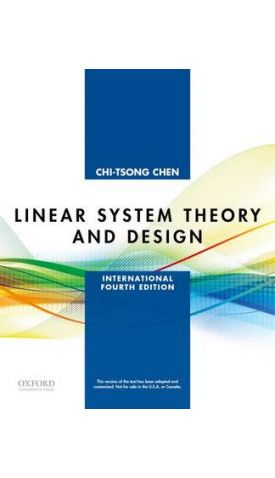אנו משתמשים ב-Cookies כדי לשפר את החוויה שלך. כדי לקיים ההנחיה החדשה של e-Privacy, עלינו לבקש את הסכמתך להגדיר את ה-Cookies. קבלת מידע נוסף.
1,690.00 ₪
Linear System Theory and Design: International Fourth Edition 4th Revised edition
1,690.00 ₪
ISBN13
9780199964543
יצא לאור ב
New York
מהדורה
4th Revised edition
זמן אספקה
21 ימי עסקים
עמודים
416
פורמט
Paperback / softback
תאריך יציאה לאור
27 בפבר׳ 2014
שם סדרה
The Oxford Series in Electrical and Computer Engineering
Striking a balance between theory and applications, Linear System Theory and Design, INternational Fourth Edition, uses simple and efficient methods to develop results and design procedures that students can readily employ. Ideal for advanced undergraduate courses and first-year graduate courses in linear systems and multivariable system design, it is also a helpful resource for practicing engineers.
Striking a balance between theory and applications, Linear System Theory and Design, INternational Fourth Edition, uses simple and efficient methods to develop results and design procedures that students can readily employ. Ideal for advanced underrgraduate courses and first-year graduate courses in linear systems and multivariable system design, it is also a helpful resource for practicing engineers.
| מהדורה | 4th Revised edition |
|---|---|
| עמודים | 416 |
| פורמט | Paperback / softback |
| ISBN10 | 0199964548 |
| יצא לאור ב | New York |
| תאריך יציאה לאור | 27 בפבר׳ 2014 |
| תוכן עניינים | 1 Introduction ; 1.1 Introduction ; 1.2 Overview ; 1.2.1 A brief history ; 2 Mathematical Descriptions of Systems ; 2.1 Introduction ; 2.2 Causality, lumpedness, and time-invariance ; 2.2.1 Impulses ; 2.3 Linear time-invariant (LTI) systems ; 2.3.1 Multi-input multi-output case ; 2.4 Linear time-varying systems ; 2.3.1 Linearization ; 2.5 RLC circuits { Comparisons of various descriptions ; 2.6 Mechanical and hydraulic systems ; 2.7 Proper rational transfer functions ; 2.8 Discrete-time linear time-invariant systems ; 2.9 Concluding remarks ; Problems ; 3 Linear Algebra ; 3.1 Introduction ; 3.2 Basis, representation, and orthonormalization ; 3.3 Linear algebraic equations ; 3.4 Similarity transformation ; 3.5 Diagonal form and Jordan form ; 3.6 Functions of a square matrix ; 3.7 Lyapunov equation ; 3.8 Some useful formula ; 3.9 Quadratic form and positive de niteness ; 3.10 Singular value decomposition ; 3.11 Norms of matrices ; Problems ; 4 State-Space Solutions and Realizations ; 4.1 Introduction ; 4.2 General solution of CT LTI state-space equations ; 4.2.1 Discretization ; 4.2.2 General solution of DT LTI state-space equations ; 4.3 Computer computation of CT state-space equations ; 4.3.1 Real-time processing ; 4.3.2 Op-amp circuit implementation ; 4.4 Equivalent state equations ; 4.4.1 Canonical forms ; 4.3.2 Magnitude scaling in op-amp circuits ; 4.5 Realizations ; 4.5.1 Multi-input multi-output case ; 4.6 Solution of linear time-varying (LTV) equations ; 4.6.1 Discrete-time case ; 4.7 Equivalent time-varying equations ; 4.8 Time-varying realizations ; Problems ; 5 Stability ; 5.1 Introduction ; 5.2 Input-output stability of LTI systems ; 5.3 Discrete-time case ; 5.4 Internal stability ; 5.4.1 Discrete-time case ; 5.5 Lyapunov theorem ; 5.5.1 Discrete-time case ; 5.6 Stability of LTV systems ; Problems ; 6 Controllability and Observability ; 6.1 Introduction . ; 6.2 Controllability ; 6.2.1 Controllability indices ; 6.3 Observability ; 6.3.1 Observability indices ; 6.4 Canonical decomposition ; 6.5 Conditions in Jordan-form equations ; 6.6 Discrete-time state-space equations . ; 6.6.1 Controllability to the origin and reachability ; 6.7 Controllability after sampling ; 6.8 LTV state-space equations ; Problems ; 7 Minimal Realizations and Coprime Fractions ; 7.1 Introduction ; 7.2 Implications of coprimeness ; 7.2.1 Minimal realizations ; 7.2.2 Complete characterization ; 7.3 Computing coprime fractions ; 7.3.1 QR decomposition ; 7.4 Balanced realization ; 7.5 Realizations from Markov parameters ; 7.6 Degree of transfer matrices ; 7.7 Minimal realizations{Matrix case ; 7.8 Matrix polynomial fractions ; 7.8.1 Column and row reducedness ; 7.8.2 Computing matrix coprime fractions ; 7.9 Realization from matrix coprime fractions ; 7.10 Realizations from matrix Markov parameters ; 7.11 Concluding remarks ; Problems ; 8 State Feedback and State Estimators ; 8.1 Introduction ; 8.2 State feedback ; 8.2.1 Solving Lyapunov equation ; 8.3 Regulation and tracking ; 8.3.1 Robust tracking and disturbance rejection ; 8.3.2 Stabilization ; 8.4 State estimator ; 8.4.1 Reduced-dimensional state estimator ; 8.5 Feedback from estimated states . ; 8.6 State feedback{MIMO case ; 8.6.1 Cyclic design ; 8.6.2 Lyapunov-equation method ; 8.6.3 Canonical-form method ; 8.6.4 E ect on transfer matrices ; 8.7 State estimators{MIMO case ; 8.8 Feedback from estimated states{MIMO case ; Problems ; 9 Pole Placement and Model Matching ; 9.1 Introduction ; 9.2 Preliminary { Matching coe cients ; 9.2.1 Compensator equation{Classical method ; 9.3 Unity-feedback con guration{Pole placement ; 9.3.1 Regulation and tracking ; 9.3.2 Robust tracking and disturbance rejection ; 9.3.3 Embedding internal models ; 9.4 Implementable transfer functions ; 9.4.1 Model matching{Two-parameter con guration ; 9.4.2 Implementation of two-parameter compensators ; 9.5 MIMO unity feedback systems ; 9.5.1 Regulation and tracking ; 9.5.2 Robust tracking and disturbance rejection ; 9.6 MIMO model matching{Two-parameter con guration ; 9.6.1 Decoupling ; 9.7 Concluding remarks ; Problems ; References ; Answers to Selected Problems ; Index |
| זמן אספקה | 21 ימי עסקים |



Login and Registration Form